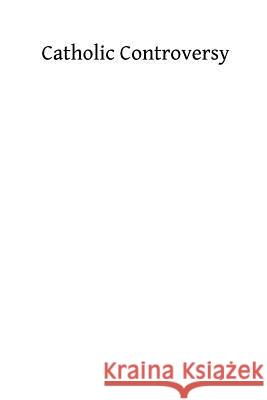Catholic Controversy: A Reply to Dr. Littledale's "Plain Reasons" » książka
Catholic Controversy: A Reply to Dr. Littledale's "Plain Reasons"
ISBN-13: 9781493695263 / Angielski / Miękka / 2013 / 306 str.
DR. LITTLEDALE has brought out, under the auspices of the Christian Knowledge Society, a little manual entitled "Plain Reasons against Joining the Church of Rome." With considerable ingenuity, in the brief space of some two hundred pages, he manages to pack most of the hardest things that have been said against Catholics, and especially against Popes. He has neglected no source of information, from the pages of Fathers and historians to the fly-leaf of modern gossip. It is the work of one whose heart is in his work and whose hand has not for. got its cunning. The form he has chosen is that of the modem Primer, in which it is the dainty privilege of an age impatient of toil to imbibe so much of its knowledge of science and of history. It is a form which, for all its rigid condensation, admits of keen momentary flashes of rhetoric, such as the sober solid work might almost seem to yield spontaneously, as sparks fly up under the steady blows of the pickaxe, and which are so doubly telling as the eloquence of reserve. When applied to history, however, this form is specially exposed to the danger of substituting rhetorical selection for scientific condensation. Dr. Littledale's theory, as I understand it, may be thus summed up. All that answers to the name" Church of Christ," at present in being, are certain scattered organisms with more or less of local life and action. There is no such thing as "ecclesiastical infallibility" (p. 132), but only an assurance that the Church is "indefectible in the long run." It is a "legal fact "-whatever that may mean-that General Councils are not general, "no matter how many bishops have sat in them, till they have been accepted by the main body of Christendom." In some subtle deference to this "in the long run" indefectibility, and acceptance "of the main body of Christendom," each member of the Church is to exercise, his private judgment as to what is scriptural or sufficiently patristic, and to cleave thereto despite the assumptions of authority. The Church of England, as contrasted with the Church of Rome, presents exceptional advantages for carrying out this ideal of Church-life; whereas the Roman Church means tyranny, uncertainty and unsoundness in faith and morals, repudiation of Scripture and antiquity, an absolute void, or at least a complete uncertainty, as to orders and jurisdiction, and a conspicuous absence of the notes of the Church, Unity, S.mctity, Apostolicity, Catholicity. I readily admit that no Anglican who can be prevailed upon to accept Dr. Littledale's "Plain Reasons" as truths, will see his way towards bettering himself either morally or spiritually in what he would call the" Roman Communion." It is hardly likely that the Catholicism of anyone who has sat at Dr. Littledale's feet will any more be troublesome, for the dangerous substance will have become thoroughly disintegrated by the stream of what I may call ecclesiastical scepticism to which it is exposed. Ritualism so qualified makes very fair Protestantism; and this perhaps is the key to what at first is so very astonishing, the appearance of Dr. Littledale in the livery of the S.P.C.K. What, one is tempted to ask, can a society supposed to represent the sober middle majority of High and Low Church, the staple of moderate Church of Englandism, have to do with an ultra-Ritualist who denounces the Reformers as ruffians, and celebrates daily with wafer and chasuble, unless, indeed, under all these. offensive trappings the true Protestant is recognised? This being supposed, however, one can understand that the outward incongruity may lend a zest to the alliance."
Zawartość książki może nie spełniać oczekiwań – reklamacje nie obejmują treści, która mogła nie być redakcyjnie ani merytorycznie opracowana.











